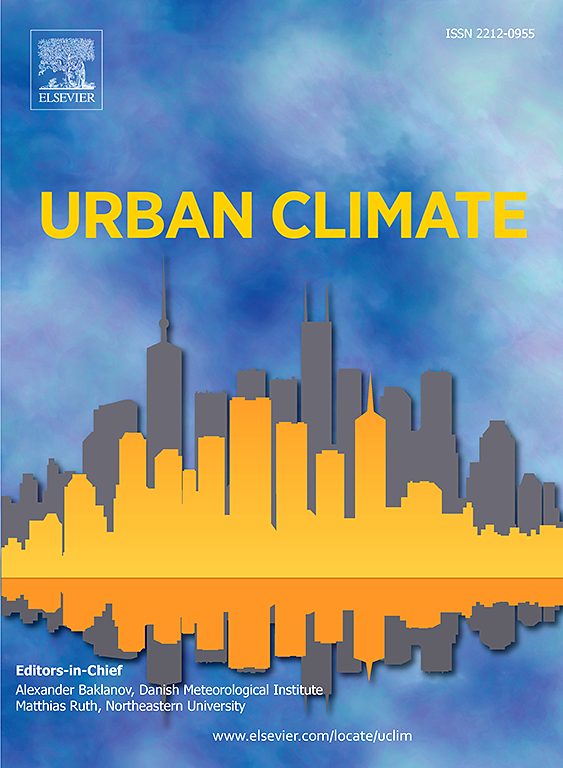Urban heat island and the risk of schizophrenia spectrum disorders in middle-aged and older adults
IF 6
2区 工程技术
Q1 ENVIRONMENTAL SCIENCES
引用次数: 0
Abstract
Rapid urbanization and climate crisis amplified the adverse effects of urban heat, while it remained unclear about the long-term impacts of urban heat island (UHI) on mental disorders, especially schizophrenia spectrum disorders (SSD). This study included 393,507 participants from the UK Biobank to examine the impact of long-term exposure to UHI on the incidence risk of SSD and changes of brain structures. UHI exposure were quantified as surface UHI intensity and normalized land surface temperature from satellite data. Cox proportional hazard models and multiple linear regression models were used to examine associations of UHI effects with SSD and changes of brain structures. During a median follow-up of 13.8 years, there were 1112 (0.3 %) participants diagnosed with SSD and 367 (0.1 %) with schizophrenia. Every standard deviation increased surface UHI intensity was associated with a 17 % (HR, 1.17; [95 % CI, 1.07–1.28]) excess risk of SSD and a 26 % excess risk of schizophrenia (HR, 1.26; [95 % CI, 1.08–1.46]). These effects were more pronounced in individuals with a high genetic risk of schizophrenia and those aged <60 years. UHI exposure was also associated with brain macrostructure and microstructure, particularly in the frontal and temporal lobes, as well as white matter tracts. In this cohort study of middle-aged and older adults, UHI exposure was identified as a risk factor for the onset of SSD and schizophrenia. These findings highlight the need for implementing initiatives of UHI mitigation and heat resilience to improve mental health and sustainable development in urban communities worldwide.
城市热岛与中老年人精神分裂症谱系障碍的风险
快速城市化和气候危机加剧了城市高温的不利影响,而城市热岛(UHI)对精神障碍,特别是精神分裂症谱系障碍(SSD)的长期影响尚不清楚。这项研究包括来自英国生物银行的393507名参与者,以检查长期暴露于UHI对SSD发病率风险和脑结构变化的影响。通过卫星数据将UHI暴露量化为地表UHI强度和归一化地表温度。采用Cox比例风险模型和多元线性回归模型检验UHI效应与SSD和脑结构变化的关系。在中位13.8年的随访期间,有1112名(0.3%)参与者被诊断为SSD, 367名(0.1%)参与者被诊断为精神分裂症。每增加一个标准偏差,表面UHI强度增加17% (HR, 1.17;[95% CI, 1.07-1.28])和26%的精神分裂症风险(HR, 1.26;[95% ci, 1.08-1.46])。这些影响在精神分裂症遗传风险高的个体和60岁以上的人群中更为明显。UHI暴露也与大脑宏观结构和微观结构有关,特别是在额叶和颞叶以及白质束。在这项针对中老年人的队列研究中,UHI暴露被确定为SSD和精神分裂症发病的危险因素。这些发现突出表明,有必要实施缓解城市热岛病和热恢复能力举措,以改善全球城市社区的心理健康和可持续发展。
本文章由计算机程序翻译,如有差异,请以英文原文为准。
求助全文
约1分钟内获得全文
求助全文
来源期刊

Urban Climate
Social Sciences-Urban Studies
CiteScore
9.70
自引率
9.40%
发文量
286
期刊介绍:
Urban Climate serves the scientific and decision making communities with the publication of research on theory, science and applications relevant to understanding urban climatic conditions and change in relation to their geography and to demographic, socioeconomic, institutional, technological and environmental dynamics and global change. Targeted towards both disciplinary and interdisciplinary audiences, this journal publishes original research papers, comprehensive review articles, book reviews, and short communications on topics including, but not limited to, the following:
Urban meteorology and climate[...]
Urban environmental pollution[...]
Adaptation to global change[...]
Urban economic and social issues[...]
Research Approaches[...]
 求助内容:
求助内容: 应助结果提醒方式:
应助结果提醒方式:


